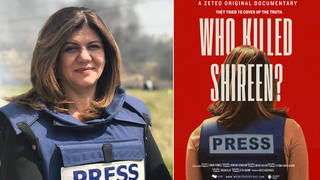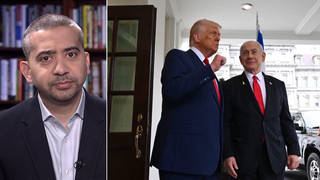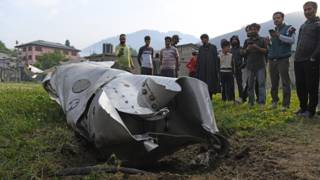Hi there,
It is the job of the press to cover power, not cover for power—to hold those in power accountable by documenting what's happening on the ground and amplifying voices at the grassroots. In this critical moment, as attacks on the media escalate, we must continue to cover crackdowns on dissent, immigrants, the LGBTQ+ community, public health and academic freedom. Thanks to a group of generous donors, all donations made today will be DOUBLED, which means your $15 gift is worth $30. If our journalism is important to you, please donate today. Every dollar makes a difference. Thank you so much.
Democracy Now!
Amy Goodman
Hi there,
It is the job of the press to cover power, not cover for power—to hold those in power accountable by documenting what's happening on the ground and amplifying voices at the grassroots. In this critical moment, as attacks on the media escalate, we must continue to cover crackdowns on dissent, immigrants, the LGBTQ+ community, public health and academic freedom. Thanks to a group of generous donors, all donations made today will be DOUBLED, which means your $15 gift is worth $30. If our journalism is important to you, please donate today. Every dollar makes a difference. Thank you so much.
Democracy Now!
Amy Goodman
Non-commercial news needs your support.
We rely on contributions from you, our viewers and listeners to do our work. If you visit us daily or weekly or even just once a month, now is a great time to make your monthly contribution.
Please do your part today.
HeadlinesSeptember 04, 2013
Obama Picks Up Key Congressional Support as Debate Begins on Syria Strike
President Obama’s plan to bomb Syria has won key congressional support just as lawmakers begin a series of votes. Members of the Senate Foreign Relations Committee have agreed on a draft measure that would authorize a 60-day window for military action against Syria, with a potential 30-day extension. Debate on a similar measure begins today in the House, and full votes in both chambers are expected Monday. President Obama picked up more Republican support on Tuesday, with both House Speaker John Boehner and Majority Leader Eric Cantor pledging to back military action against Syria. House Minority Leader Nancy Pelosi also endorsed President Obama’s call for a military strike, despite acknowledging a lack of support among her constituents in California. In a meeting with lawmakers, Obama vowed to pursue a “limited” strike on Syria, and suggested that he may expand U.S. assistance to rebels fighting the Assad regime.
President Obama: “What we are envisioning is something limited. It is something proportional. It will degrade Assad’s capabilities. At the same time, we have a broader strategy that will allow us to upgrade the capabilities of the opposition, allow Syria ultimately to free itself from the kinds of terrible civil wars and death and activity that we’ve been seeing on the ground.”
Kerry Won’t Rule Out “Boots on the Ground” in Syria
In a further bid to win congressional support, Secretary of State John Kerry appeared before the Senate Foreign Relations Committee along with Defense Secretary Chuck Hagel and General Martin Dempsey. In his comments, Kerry initially refused to rule out the eventual deployment of “boots on the ground,” saying he can’t take an option “off the table.”
Secretary of State John Kerry: “In the event there was a threat of a chemical weapons cache falling into the hands of al-Nusra or someone else, and it was clearly in the interests of our allies and all of us — the British, the French and others — to prevent those weapons of mass destruction falling into the hands of the worst elements, I don’t want to take off the table an option that might or might not be available to a president of the United States to secure our country.”
Kerry later walked back his comments on committing U.S. troops, saying the White House has no such plans. The New York Times, meanwhile, reports at least 50 CIA-trained rebels have now crossed into Syria from Jordan.
Ban: Syria Attack Without U.N. Backing “Unlawful”
At the United Nations, Secretary-General Ban Ki-moon weighed in on the threat of a U.S.-led strike on Syria, saying it would be illegal unless authorized by the Security Council or if made in self-defense under the U.N. Charter.
Secretary-General Ban Ki-moon: “We must consider the impact of any punitive measure on efforts to prevent further bloodshed and facilitate a political resolution of the conflict. The turmoil in Syria and across the region serves nobody. The use of force is lawful only when in exercise of self-defense in accordance with Article 51 of the United Nations Charter and/or when the Security Council approves such action.”
Obama in Sweden Before G-20 Summit
President Obama is in Sweden today before going on to Russia for the G-20 Summit in Saint Petersburg, where Syria is likely to dominate talks.
Dozens Killed in Iraq Violence
A series of bombings in the Iraqi capital of Baghdad on Tuesday has left nearly 60 people dead. The attacks come amidst Iraq’s worst violence in five years. The United Nations says more than 800 people were killed in Iraq last month after over 1,000 died in July — the highest monthly toll since 2008. The United Nations, meanwhile, says at least 52 members of the Iranian exile group MEK were killed over the weekend at a camp north of Baghdad. It was the latest in a series of attacks targeting the MEK, which was formerly aligned with Saddam Hussein and later the U.S. military.
Thousands Rally Against Egypt Gov’t; Al Jazeera Alleges Signal Disruption
Thousands of Muslim Brotherhood supporters rallied in Egypt on Tuesday to mark two months since the military’s ouster of Egyptian President Mohamed Morsi. The rallies came as Egyptian courts sentenced a number of Muslim Brotherhood members to lengthy jail terms for their role in protests since Morsi’s overthrow and the military’s deadly raids on pro-Morsi encampments. The interim government, meanwhile, is continuing efforts to silence the Arabic satellite network Al Jazeera. On Tuesday, a Cairo court ordered closure of Al Jazeera’s Egyptian affiliate. Al Jazeera also directly accused the interim government of deliberately jamming its satellite signals in a bid to disrupt its broadcasts. Three Al Jazeera employees were deported from Egypt on Monday after being detained for nearly a week.
Fukushima Radiation at Record High
Radiation levels at Japan’s stricken Fukushima nuclear plant have hit a new high. The latest figures show radiation levels of 2,200 millisieverts, an increase of more than 20 percent and the worst level in the plant’s holding tanks since an earthquake and tsunami caused a triple-reactor meltdown at Fukushima in March 2011. The plant’s operators say the higher levels are explained by improved detection equipment, not new leaks. The news comes one day after Japan pledged to spend around $500 million to stop the leaking of radioactive water. That announcement came in advance of the International Olympic Committee’s pending decision on whether to hold the 2020 Olympics in Tokyo. Japanese Prime Minister Shinzo Abe said he will assure the IOC that Fukushima would not threaten the Olympics’ safety.
Japanese Prime Minister Shinzo Abe: “We understand that there have been people voicing concerns over the contaminated water issue in Fukushima. What I can say is the government is taking the lead here to completely solve the issue. And to do that, we are implementing drastic measures with firm resolve. I will be explaining to the International Olympic Committee that in seven years’ time it will not be a problem at all.”
South African Gold Miners Launch Strike for Higher Wages
In South Africa, some 80,000 gold miners went on strike Tuesday night to demand higher pay. The miners union has rejected an offer from industry bosses for a 6 percent pay hike, calling the offered amount “slave wages.” In a statement, the National Union of Mine Workers said “given the arrogance of the captains of the gold mining industry, the union is forced to embark on nationwide industrial action that will change the gold mining landscape forever.” The strike comes just over a year after South African police opened fire on striking workers at the Marikana platinum mine, killing 34 people.
Tens of Thousands of Teachers Strike in Mexico
In Mexico, tens of thousands of striking teachers are continuing protests against an education overhaul they say is aimed at privatizing education and weakening their rights. For two weeks, the teachers have occupied the main square in Mexico City, demanding adequate funding for rural schools and policies that respect indigenous cultures. They oppose reforms touted by Mexican President Enrique Peña Nieto, which include plans to base teacher hiring on mandatory evaluations. Educators in Mexico have a long history of resistance, including a key role in the 2006 uprising in the Mexican state of Oaxaca, where a crackdown on striking teachers sparked a massive popular movement against the governor. Alfonso Arellano, from Oaxaca’s Section 22 of the teachers’ union, spoke during a major protest on Sunday in Mexico City.
Alfonso Arellano: “We want Articles 3 and 73 to be repealed. The current government, the PRI government, has wrongly called this education reform, but really it is labor reform. Why? Why? Because it goes after our rights as workers. Educational reform would be structural and related to the curriculum and directly related to the students. This wrongly called labor reform is changing constitutional articles and putting into risk all of the labor rights that the national union and the national coordinator has gained with 30 years of struggle.”
At least four independent journalists were reportedly arrested at Sunday’s protest and two are now being held in prison. Peña Nieto delivered his state-of-the-union address on Monday instead of Sunday in a bid to avoid the unrest. Peña Nieto is also facing protests over plans to overhaul Mexico’s energy sector by opening the state-controlled oil company to investment from foreign multinationals.
Ariel Castro Found Hanged in Ohio Prison Cell
Ariel Castro, the Cleveland man sentenced to life in prison for the kidnapping, rape and torture of three women he held captive for over a decade, has been found dead in his prison cell. Prison guards say Castro hanged himself during a break between regular inspections. He was sentenced to life plus 1,000 years last month after pleading guilty to hundreds of kidnapping and rape charges in the forced imprisonment of Amanda Berry, Gina DeJesus and Michelle Knight, who escaped from Castro’s basement in May. Castro fathered a six-year-old daughter with Berry after raping her, and also forced Knight to miscarry multiple times through beatings and starvation. Castro had been jailed in protective custody, away from other prisoners.
Montana Judge Reconsiders Rape Sentence After Outcry
A Montana judge has agreed to review his sentencing of a high-school teacher to just 30 days in prison for raping a 14-year-old student who later took her own life. Prosecutors had sought a 20-year prison term for the teacher, Stacey Rambold, but the judge, Todd Baugh, sentenced him to just one month. Judge Baugh drew public outrage after he claimed the 14-year-old victim was “older than her chronological age” and “as much in control of the situation” as the teacher. On Tuesday, Baugh said he was probably too lenient in his sentence and announced a hearing to review his decision.
Bloomberg Sues NYC Council over Police Racial Profiling Curbs
New York City Mayor Michael Bloomberg has sued the City Council over a measure aimed at cracking down on racial profiling by police. The council overrode Bloomberg’s veto power last month to broaden the definition of biased profiling and grant targeted New Yorkers the right to sue police in state court. The measure was passed along with a separate bill creating an independent inspector general to oversee the New York City Police Department. Those votes came shortly after a federal judge declared the NYPD’s “stop and frisk” tactics unconstitutional for discriminating against people of color, particularly African Americans and Latinos. In his new lawsuit, Bloomberg says the council’s decisions are invalid because state law supersedes.
Chelsea Manning Files Request for Presidential Pardon
Attorneys for the imprisoned Army whistleblower Chelsea Manning, formerly known as Bradley Manning, have formally filed a request for a presidential pardon. Manning was sentenced to 35 years in prison last month for leaking U.S. government and military files to WikiLeaks. After the verdict, Manning announced a gender transition from male to female, changing her name to Chelsea. Supporters say they plan to release the full text of Manning’s pardon request today.
Most popular
- 1
- 2
- 3
- 4
Non-commercial news needs your support
Please do your part today.












Media Options